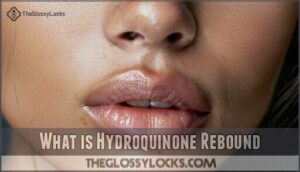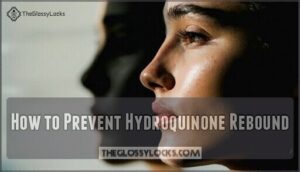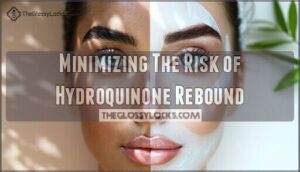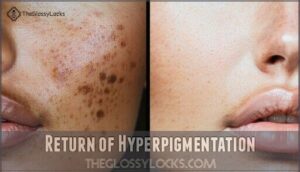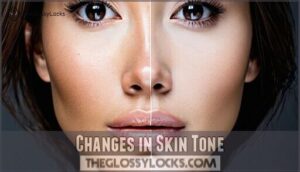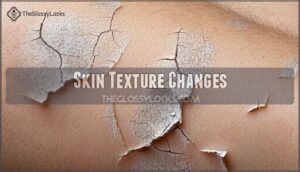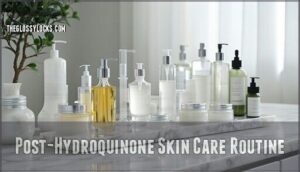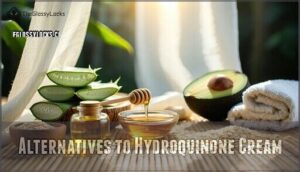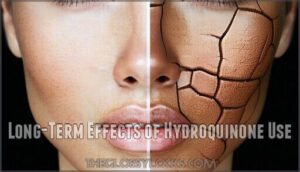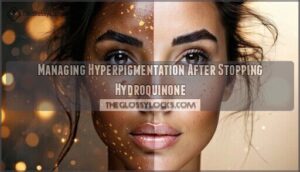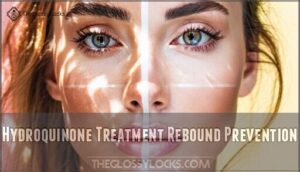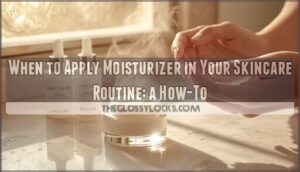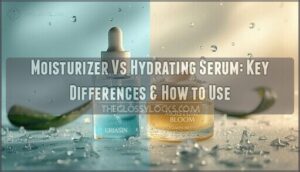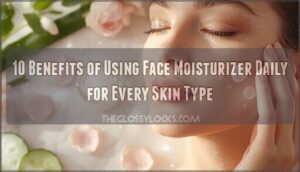This site is supported by our readers. We may earn a commission, at no cost to you, if you purchase through links.
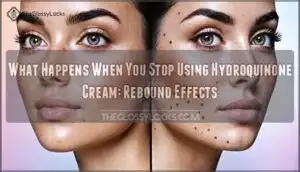
Your dark spots can return darker than before, like your skin’s making up for lost time. You’ll likely notice increased sensitivity, temporary irritation, and the gradual return of pigmentation issues you were treating.
This rebound effect isn’t permanent, but it can feel like watching your progress disappear overnight.
The key is never stopping cold turkey – dermatologists recommend tapering off gradually over several months to minimize this frustrating yo-yo effect.
There are proven strategies to make this shift smoother and protect your hard-earned results.
Table Of Contents
- Key Takeaways
- Stopping Hydroquinone Cream Use
- Hydroquinone Rebound and Skin Pigmentation
- Hydroquinone Withdrawal Symptoms
- Skin Changes After Stopping Hydroquinone
- Post-Hydroquinone Skin Care Routine
- Alternatives to Hydroquinone Cream
- Long-Term Effects of Hydroquinone Use
- Managing Hyperpigmentation After Stopping Hydroquinone
- Hydroquinone Treatment Rebound Prevention
- Frequently Asked Questions (FAQs)
- What are the side effects of hydroquinone?
- Does hydroquinone cause skin irritation?
- How long does hydroquinone cream last?
- When should I stop using hydroquinone?
- Can hydroquinone darken skin?
- Can you get a hydroquinone cream over the counter?
- Do you need to take a break from hydroquinone?
- How to cycle on and off hydroquinone?
- When should I stop using hydroquinone cream?
- What happens if hydrocele is not treated?
- Conclusion
Key Takeaways
- You’ll experience rebound hyperpigmentation – Your skin produces excess melanin after stopping, often making dark spots darker than they were before you started treatment
- Never stop cold turkey – Gradually taper your hydroquinone use over 2-4 months to minimize the harsh rebound effects and prevent your skin from going into overdrive
- Sun protection becomes critical – Your skin’s heightened sensitivity after stopping makes daily broad-spectrum SPF 30+ essential to prevent new dark spots and protect your progress
- Alternative treatments can maintain results – Vitamin C, kojic acid, and niacinamide help control melanin production without hydroquinone’s risks, preventing that frustrating yo-yo effect
Stopping Hydroquinone Cream Use
Deciding to stop hydroquinone cream can feel overwhelming, especially when you’re worried about your skin reverting to its original state.
The good news is that understanding what happens next helps you prepare for a smoother shift and maintain your hard-earned results.
Reasons for Stopping Hydroquinone Cream
People stop using hydroquinone cream for various reasons, and understanding these motivations helps you make informed decisions about your skincare journey.
Maybe you’ve hit the recommended treatment timeline, or perhaps unwanted effects are cramping your style.
Common reasons include:
- Treatment side effects like irritation, redness, or unexpected skin discoloration returns
- Hydroquinone risks concerns, including potential skin damage from prolonged use
- Skin health goals shifting toward gentler alternatives for managing hyperpigmentation
Preparing to Stop Hydroquinone Cream
Gradual reduction beats cold turkey when stopping hydroquinone.
Skin preparation starts with consulting your dermatologist about hydroquinone alternatives like vitamin C or kojic acid.
Begin post treatment planning by establishing rebound prevention strategies—think sunscreen as your new best friend.
Cream withdrawal doesn’t mean abandoning skincare entirely. Your skin needs support, not abandonment, during this phase of adjustment.
Effective anti aging skin care requires careful consideration of various factors, including the use of daily sunscreen products to prevent further damage.
Understanding The Rebound Effect
When you discontinue hydroquinone, your skin doesn’t simply return to normal—it often overcompensates.
The rebound effect occurs as melanin production surges back, frequently creating darker spots than before treatment began.
Here’s what drives hydroquinone withdrawal:
- Rebound Causes: Your melanocytes restart melanin production at accelerated rates
- Skin Darkening: Hyperpigmentation often appears worse than pre-treatment levels
- Postinflammatory Hyperpigmentation: Irritated skin produces excess pigment during recovery
- Skin Sensitivity: Your newly vulnerable skin reacts strongly to sun exposure
- Rebound Prevention: Gradual tapering reduces withdrawal severity substantially
Hydroquinone Rebound and Skin Pigmentation
When you stop using hydroquinone cream, your skin doesn’t just go back to normal—it often rebounds with darker pigmentation than before you started treatment.
This rebound effect happens because your melanocytes (pigment-producing cells) kick into overdrive, creating what feels like two steps backward after taking one step forward.
What is Hydroquinone Rebound
When you stop using hydroquinone cream, your skin might throw a tantrum called hydroquinone rebound.
This rebound effect occurs as melanin production kicks back into high gear, often causing skin darkening beyond your original pigmentation levels.
The hyperpigmentation rebound typically appears within 2-6 weeks after stopping treatment, making your skin look darker than before you started.
How to Prevent Hydroquinone Rebound
Think of rebound prevention like training wheels—you need gradual support before going solo.
Gradual tapering of hydroquinone cream prevents your skin from throwing a tantrum. Introduce hydroquinone alternatives like vitamin C or kojic acid during the process.
Gentle skincare and daily sunscreen shield against hyperpigmentation management nightmares. Your skin will thank you later!
Minimizing The Risk of Hydroquinone Rebound
Your skin’s recovery depends on smart rebound prevention strategies.
Skin tapering works better than abrupt cessation—reduce hydroquinone use gradually over weeks.
Start hydroquinone alternatives like vitamin C early to maintain hyperpigmentation management.
Gentle skincare with antioxidants helps control melanin production.
This approach prevents dramatic skin darkening and reduces withdrawal symptoms that trigger rebound pigmentation.
Hydroquinone Withdrawal Symptoms
When you stop using hydroquinone cream, your skin doesn’t just return to its original state quietly.
You’ll likely experience withdrawal symptoms as your melanocytes wake up and start producing pigment again, often with a vengeance.
Common Withdrawal Symptoms
Breaking away from hydroquinone isn’t always smooth sailing. Your skin might throw a minor rebellion with several withdrawal symptoms that can catch you off guard.
Skin irritation affects up to 38% of people, bringing redness and stinging sensations that feel like an unwelcome surprise party on your face.
Here’s what you might experience:
- Rebound hyperpigmentation – Dark spots return with a vengeance as melanin production kicks back into high gear
- Increased sun sensitivity – Your skin becomes more vulnerable to UV damage, affecting nearly 29% of users
- Inflammation and dryness – Flakiness and irritation can persist for several weeks
These rebound effects happen because your skin adjusts to life without its melanin-blocking buddy.
Managing Withdrawal Symptoms
Frustration hits when withdrawal symptoms appear after stopping hydroquinone.
Skin Recovery starts with Gentle Products that won’t aggravate skin irritation.
Use mild cleansers and fragrance-free moisturizers for Symptom Relief.
Rebound Prevention requires consistent Hyperpigmentation Management through careful product selection.
Understanding skin irritation causes is essential for effective management and relief.
| Symptom | Management Strategy | Expected Timeline |
|---|---|---|
| Skin irritation | Cool compresses, gentle cleansers | 1-2 weeks |
| Inflammation | Anti-inflammatory serums, avoid actives | 2-3 weeks |
| Skin discoloration | Vitamin C, consistent moisturizing | 4-6 weeks |
| Hyperpigmentation | Gentle exfoliation, sun protection | 6-12 weeks |
| Skin sensitivity | Minimal product routine, barrier repair | 2-4 weeks |
Reducing The Severity of Withdrawal Symptoms
While withdrawal symptoms can feel overwhelming, smart Symptom Management helps you navigate this progression smoothly.
Your skin sensitivity will settle as you introduce Gentle Products that calm irritation without triggering hyperpigmentation.
Rebound Prevention starts with consistent Sun Protection and patience.
- Apply fragrance-free moisturizers twice daily to combat dryness
- Use mineral sunscreen with SPF 30+ to prevent darkening
- Switch to gentle, pH-balanced cleansers that won’t strip skin tone
- Consider vitamin C serums for gradual Skin Soothing benefits
Skin Changes After Stopping Hydroquinone
When you stop using hydroquinone cream, your skin doesn’t stay the same forever.
You’ll likely notice your original dark spots creeping back within a few weeks, and your overall skin tone might shift as melanin production kicks back into gear.
Return of Hyperpigmentation
Dark spots make a comeback like old habits die hard.
Hyperpigmentation returns within 2-12 weeks as melanin production resumes normal activity.
Rebound effects hit hardest when melasma worsens without broad-spectrum sunscreen.
Your skin tone changes gradually as pigment changes reverse previous improvements, making hyperpigmentation solutions essential for maintaining results.
Changes in Skin Tone
When you discontinue hydroquinone treatment, skin darkening becomes your skin’s natural response as melanin production resumes.
Tone rebound occurs gradually, with dark spots reappearing within weeks. Hyperpigmentation returns as your melanin shift reverses the lightening effects.
Color change varies by individual—some experience subtle variations while others notice dramatic skin tone changes. Think of it like removing sunglasses; your eyes readjust to natural light levels.
To mitigate such effects, understanding anti aging skin care is essential for maintaining healthy skin.
Skin Texture Changes
Your skin’s texture might feel like sandpaper after stopping hydroquinone.
This happens because your skin barrier weakens and inflammation risk increases, making skin becomes vulnerable to dryness and peeling.
Here’s what helps with texture smoothing:
- Collagen boost treatments like retinoids
- Pore minimization with gentle acids
- Skin firming moisturizers for elasticity restoration
Post-Hydroquinone Skin Care Routine
Once you stop hydroquinone, your skin needs extra care to prevent rebound effects and maintain its health.
A proper post-hydroquinone routine focuses on gentle ingredients, consistent sun protection, and rebuilding your skin’s natural barrier.
Key Ingredients for Post-Hydroquinone Care
Moving off hydroquinone requires strategic ingredient choices to maintain your skin’s progress.
Your post-hydroquinone arsenal should include these powerhouse components:
- Vitamin C and antioxidants: Combat free radicals while brightening skin naturally
- Moisturizing serums with niacinamide: Strengthen your skin barrier and reduce inflammation
- Sunscreen protection with gentle exfoliants: Shield against UV damage while promoting cell turnover
Kojic acid and azelaic acid offer additional brightening support without hydroquinone’s harsh effects.
Using a Vitamin C serum can be particularly beneficial for maintaining healthy skin.
Building a Gentle Skin Care Routine
After stopping hydroquinone, your skin craves gentle cleansing and TLC. Start with mild, fragrance-free cleansers that won’t strip your skin’s natural oils.
Follow with hydrating serums containing hyaluronic acid for skin hydration. Weekly skin exfoliation using gentle acids removes dead cells without irritation.
Moisturizers with ceramides repair your skin barrier, while consistent moisturizing tips include applying to damp skin for better absorption.
This gentle skincare routine promotes skin health and your natural glow. Using a gentle skin product is essential for maintaining healthy skin.
Protecting The Skin From The Sun
Protection becomes your skin’s best friend after hydroquinone. Your skin’s heightened sun sensitivity demands serious UV protection to prevent rebound hyperpigmentation and solar damage.
Essential photoprotection steps:
- Apply broadspectrum sunscreen with SPF 30+ daily, rain or shine
- Reapply every two hours when outdoors or after sweating
- Wear protective clothing like wide-brimmed hats and long sleeves
- Seek shade during peak UV hours (10 AM to 4 PM)
- Use UV-blocking sunglasses to shield delicate eye area skin
Think of sunscreen as your skin’s bodyguard—it’s working overtime to keep those hard-earned results intact while your melanocytes recalibrate.
Alternatives to Hydroquinone Cream
When you’re ready to move beyond hydroquinone, you’ll find plenty of effective alternatives that can maintain your skin’s progress.
These options range from gentle natural ingredients to proven chemical treatments, giving you flexibility to choose what works best for your skin type and concerns.
Natural Alternatives for Hyperpigmentation
Natural alternatives offer freedom from hydroquinone’s risks while targeting hyperpigmentation effectively.
Vitamin C brightens skin by inhibiting melanin production, while Kojic Acid delivers comparable results to prescription treatments.
Licorice Extract reduces dark spots naturally, and Marine Algae provides antioxidant protection.
Aloe Vera soothes inflammation during your recovery.
Using a high quality Vitamin C Serum can enhance the skin’s natural glow.
Licorice Root
Vitamin C
These alternative treatments work gently without harsh side effects.
Chemical Alternatives to Hydroquinone
When hydroquinone isn’t your friend, chemical alternatives offer safer skin lightening options.
These proven ingredients work without the harsh side effects:
- Kojic Acid – Naturally derived from fungi, blocks melanin production effectively
- Tranexamic Acid – Reduces inflammation while lightening stubborn dark spots
- Azelaic Acid – Gentle yet powerful, perfect for sensitive skin types
Arbutin and Melaplex also deliver impressive results.
These alternative treatments give you freedom from hydroquinone’s risks.
Topical Treatments for Hyperpigmentation
Beyond traditional chemical alternatives, topical treatments offer you targeted skin brightening solutions.
Facial toners with glycolic acid accelerate melanin reduction, while skin exfoliants reveal fresher layers beneath damaged tissue.
| Treatment Type | Active Ingredient | Emotional Benefit |
|---|---|---|
| Vitamin C Serums | L-Ascorbic Acid | Confidence boost from radiant glow |
| Retinoid Creams | Tretinoin | Freedom from dark spot anxiety |
| AHA Peels | Glycolic Acid | Joy of smoother, brighter skin |
| Kojic Acid Products | Kojic Acid | Relief from stubborn hyperpigmentation |
| Tranexamic Acid | Tranexamic Acid | Peace knowing you’re melanin production is controlled |
These treatments don’t just replace hydroquinone – they liberate your skin naturally.
Darker skin tones are especially prone to post-inflammatory hyperpigmentation.
Long-Term Effects of Hydroquinone Use
Understanding hydroquinone’s long-term effects becomes essential when you’ve been using this skin lightening agent for months.
While hydroquinone effectively treats hyperpigmentation, extended use can lead to serious complications that affect your skin’s health and appearance permanently.
Ochronosis and Hydroquinone Use
Through years of hydroquinone use, you risk developing ochronosis—a condition causing permanent blue-black skin discoloration.
This rare but serious complication affects 1-3% of long-term users, particularly those with darker skin tones.
Ochronosis Causes include:
- Prolonged hydroquinone application over six months
- High concentrations without medical supervision
- Lack of sun protection during treatment
- Genetic predisposition to pigment sensitivity
Once established, ochronosis proves notoriously difficult to reverse, often persisting years after stopping treatment.
Skin Sensitivity and Hydroquinone
Long-term hydroquinone use can turn your skin barrier into a drama queen.
Skin sensitivity often increases, bringing redness and irritation along for the ride.
Your skin irritation might feel like sandpaper meeting silk.
These hydroquinone risks affect melanin production and skin protection.
When hyperpigmentation treatment becomes the problem, it’s time to reassess your skincare game plan.
Impact on Skin Elasticity
Your skin’s natural Skin Firming abilities may weaken after extended hydroquinone use.
Elasticity Loss happens when Collagen Production slows down, leaving skin less bouncy than before.
Here’s what affects your skin elasticity:
- Reduced Tissue Repair capacity impacts overall skin texture
- Slower melanin production affects protective barrier strength
- Decreased skin hydration contributes to Skin Sagging
Proper care helps restore bounce.
Managing Hyperpigmentation After Stopping Hydroquinone
After stopping hydroquinone, you’ll need a solid game plan to keep hyperpigmentation from making an unwelcome comeback.
The key is staying one step ahead with the right ingredients and consistent sun protection to maintain that even skin tone you worked so hard to achieve, which involves being mindful of consistent sun protection.
Preventing Hyperpigmentation Return
After discontinuing hydroquinone, you’ll need rock-solid skin protection to prevent hyperpigmentation from creeping back.
Daily broad-spectrum sunscreen becomes your best friend—it blocks UV rays that trigger melanin production and pigment cell activity.
Think of it as insurance for your skin tone.
Without proper sun damage prevention, those dark spots you worked hard to fade can return with a vengeance, potentially causing postinflammatory hypermelanosis.
Reducing Hyperpigmentation Appearance
After stopping hydroquinone cream, your skin tone might rebel with returning dark spots.
Combat this by embracing gentle skin brightening heroes like vitamin C serums and niacinamide.
These ingredients slow melanin production without the drama.
Think of them as your skin’s peacekeepers—they’ll help fade hyperpigmentation while keeping things balanced and happy.
Maintaining Skin Evenness
Beyond reducing existing dark spots, you’ll want to keep your complexion balanced and prevent new issues from popping up.
Maintaining skin evenness after hydroquinone requires consistent habits that support healthy melanin production and prevent skin tone variations.
Here’s your game plan:
- Apply broad-spectrum SPF 30+ daily – sun exposure triggers melanin overproduction and undoes your progress
- Use gentle skin brightening ingredients – vitamin C, kojic acid, and arbutin provide ongoing melanin control
- Stick to consistent skincare timing – morning antioxidants, evening treatments for ideal skin toning
- Monitor for new hyperpigmentation triggers – hormones, friction, and inflammation can disrupt your even complexion
Hydroquinone Treatment Rebound Prevention
You can prevent the dreaded rebound effect by gradually reducing your hydroquinone use rather than stopping cold turkey.
Smart shifts to alternative treatments and combination approaches help maintain your progress while protecting your skin from that frustrating pigmentation comeback.
Gradual Tapering of Hydroquinone Use
When you’re ready to step off the hydroquinone train, don’t slam the brakes. Gradual Cessation prevents your skin from throwing a pigmentation tantrum. Dosage Reduction over 2-4 weeks helps Minimizing Rebound effects while maintaining your progress.
| Tapering Benefits | Timeline Approach |
|---|---|
| Reduces rebound risk by 61% | Week 1-2: Once daily application |
| Prevents melanin production spikes | Week 3: Every other day use |
| Maintains skin pigmentation stability | Week 4: Complete cessation |
| Minimizes skin discoloration return | Monitor for skin changes |
| Supports smooth Transition Timeline | Continue sun protection throughout |
This gradual fading options approach lets your melanocytes adjust naturally instead of shocking them back into overdrive.
Transitioning to Alternative Treatments
Moving away from hydroquinone doesn’t mean starting from scratch with your skincare journey.
Shifting to alternatives offers freedom from potential side effects while maintaining progress against uneven skin tone.
Consider these effective options that target increased melanin production through tyrosinase inhibition:
- Natural remedies like kojic acid and arbutin provide gentle, gradual fading options
- Medical skincare treatments including tretinoin boost cell turnover for smoother results
- Chemical peels and laser therapy offer professional-grade alternatives for stubborn pigmentation
These treatments help prevent rebound effects while delivering long-term improvements.
Combining Treatments for Optimal Results
Success requires smart combination treatments.
You’ll combine vitamin C with retinol or melasma treatments like kojic acid for enhanced efficacy.
These synergistic treatment approaches use layering techniques that prevent rebound while maintaining results.
A holistic approach with proper tapering schedule minimizes long-term effects and skin discoloration.
Combination benefits multiply when treatments work together.
Frequently Asked Questions (FAQs)
What are the side effects of hydroquinone?
You’ll face skin irritation like redness, burning, and peeling.
Prolonged use can cause ochronosis—permanent blue-black discoloration.
It increases sun sensitivity and may trigger allergic reactions or rebound hyperpigmentation after stopping.
Does hydroquinone cause skin irritation?
Yes, hydroquinone can cause skin irritation.
You might experience redness, dryness, burning, itching, or peeling, especially when starting treatment or using higher concentrations.
These effects typically diminish as your skin adjusts to the treatment, which usually happens over time, allowing your skin to become less sensitive.
How long does hydroquinone cream last?
Hydroquinone cream typically maintains its effectiveness for two to four months of consistent use.
You’ll start seeing results within six to twelve weeks, but don’t expect miracles overnight—patience pays off here.
When should I stop using hydroquinone?
Stop hydroquinone after 2-4 months of use to prevent ochronosis and skin damage. Take breaks between cycles, discontinue if no improvement after three months, or when you’ve achieved desired results.
Can hydroquinone darken skin?
Ironically, yes—hydroquinone can darken your skin if you overuse it or develop ochronosis, a rare condition causing blue-black discoloration that’s virtually permanent and worsens with sun exposure.
Can you get a hydroquinone cream over the counter?
Like finding a trusted pharmacy for your daily vitamins, you can purchase hydroquinone cream over-the-counter in concentrations up to 2%. Higher strengths require a doctor’s prescription for safety.
Do you need to take a break from hydroquinone?
Yes, you absolutely need breaks from hydroquinone.
Dermatologists recommend using it for only 2-4 months, then taking a break.
This prevents nasty side effects like ochronosis and keeps your skin healthy.
How to cycle on and off hydroquinone?
Use hydroquinone for 2-4 months, then take a 2-month break. Gradually taper off instead of stopping cold turkey to prevent rebound darkening. Always wear sunscreen during breaks.
When should I stop using hydroquinone cream?
A woman stopped her hydroquinone treatment after six months when her melasma cleared completely.
You should discontinue hydroquinone after achieving desired results, typically within 2-4 months, or if you experience irritation or see no improvement after three months of consistent use.
What happens if hydrocele is not treated?
If you don’t treat a hydrocele, it typically won’t cause serious harm.
But may grow larger over time.
You’ll likely experience continued discomfort, swelling, and potential embarrassment from the enlarged scrotum affecting daily activities, which can be a significant source of discomfort.
Conclusion
Maneuvering what happens when you stop using hydroquinone cream is like steering a ship through choppy waters – timing and technique matter.
You’ll face rebound hyperpigmentation as your skin ramps up melanin production, but don’t panic.
Gradual tapering over several months prevents the harshest effects.
Combine this with sun protection, gentle alternatives like vitamin C, and patience.
Your skin needs time to adjust, but with the right approach, you can maintain your progress without the dreaded yo-yo effect.

